 |
| Vol. 3 No. 10 | Table of Contents MEIB Main Page | October 2001 |
As the American war on terrorism shifts into high gear, US officials are pressuring the Lebanese government to take action against suspected terrorists in Lebanon, particularly groups and individuals with ties to Osama bin Laden. Although officials in Beirut contend that the government is cooperating with the US, there are few indications that Lebanon has made a substantial contribution to the "war on terrorism."
What the United States Wants
Following the September 11 attacks, US ambassador to Lebanon Vincent Battle met with Lebanese officials at the foreign ministry in Beirut and spelled out in very clear terms what steps must be taken by the Lebanese government in order to satisfy Washington's call for anti-terrorism cooperation. The primary demand was to "seize terrorists, prosecute them and hand over or expel those who are wanted," a Lebanese government source later told Agence France Presse. Battle was apparently not impressed with the reaction of his hosts - after leaving meeting, he publicly accused the Lebanese government of hosting "terrorist organizations."1
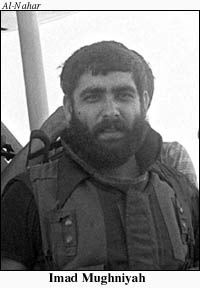 |
Mughniyah is the alleged mastermind of the June 1985 hijacking of TWA Flight 847, during which US navy diver Robert Stethem was murdered. Mughniyah is also believed to be responsible for planning the 1983 bombing of the US marine barracks in Beirut which killed 241 servicemen, as well the abduction of several American civilians in Lebanon during the 1980s. Izzidine and Atwi, described by the FBI as "members of Hezbollah's terrorism apparatus," are accused of having participated in the planning and execution of the TWA hijacking.
Officially, at least, the US government is demanding only that the assets of the above-mentioned groups and individuals be frozen. On October 15, Ambassador Battle publicly called on Lebanon's Central Bank to do so. According to Battle, the Bush administration is not pressing for the extradition of Mughniyah and the other two TWA hijacking suspects. "There is no easy extradition procedure between the United States and Lebanon," the ambassador told reporters after meeting with Lebanese Foreign Minister Mahmoud Hammoud on October 12. "As far as I understand the Lebanese law, Lebanese citizens are not extraditable to another country. So extradition is a rather difficult issue for us and no, we did not ask them to be extradited," he added. Officially, the US has not demanded that the Lebanese government extradite or freeze the assets of any suspected terrorists aside from those mentioned above.
Is Lebanon Cooperating?
The Lebanese government's response to various American requests for cooperation in its war against terrorism has been mixed. The Lebanese authorities are primarily concerned with preventing militant Islamist groups in the country from creating an atmosphere of instability which might drive away foreign investors, particularly after two arson attacks this month against churches in Tripoli and Sidon and a mosque in Batroun. The Lebanese army has established checkpoints throughout Beirut and increased patrols along major streets in the capital. Additional security forces have also been assigned to protect foreign embassies and consulates, as well as major Western cultural centers.
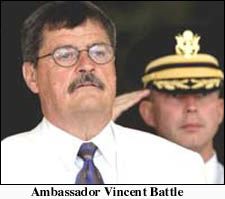 |
However, the Lebanese regime has refused to cooperate in locating the TWA suspects. When the list with the three TWA hijackers was released on October 12, Lebanese officials who were asked about the matter said that no specific request for information had been received from the US. After the American government sent a fax requesting this information to the Lebanese foreign ministry, Lebanese officials said that the fax is not an officially recognized means of communicating documents. The exasperated American ambassador eventually delivered the request in person.
Lebanese officials have since stated either that the TWA suspects have left the country, or that the government is unaware of their locations (they haven't quite gotten their story straight). The FBI says that all three TWA suspects are probably in Lebanon. Although Mughniyah established permanent residence in Tehran in the early 1990s, he is known to have periodically returned to Lebanon to visit his relatives. It is inconceivable that the Lebanese and Syrian intelligence agencies have no inkling of their whereabouts.
The Lebanese regime has long been unresponsive to US efforts to apprehend suspected terrorists. In part, this is a continuation of the government's long-standing unwillingness to take action against groups and individuals responsible for targeting American citizens during the 1975-1990 war in Lebanon. Throughout the 1990s, Washington applied considerable pressure on the Lebanese government to either hand over the TWA suspects or at least arrest them and put them on trial in Lebanon. The US provided the Lebanese Justice Ministry with full documentation of the charges and evidence it had collected. The Lebanese government ignored the demand, however, and further outraged US officials by arresting and putting on trial a group of people who were allegedly caught spying on Mughniyah on behalf of American intelligence agencies. In 1994, Lebanese security forces foiled an attempt by American agents to abduct Izzidine, the man who allegedly fired the shot that killed Stethem, from his home in a southern suburb of Beirut and transport him by speed boat to an American battleship in the Mediterranean Sea. Two years ago, a Beirut criminal court released three Lebanese who had been accused by the US of involvement in the1976 assassination of American ambassador to Lebanon David Melloy.
Ostensibly, the Lebanese government's hands are tied because of a 1991 general amnesty that protects all Lebanese citizens from prosecution for wartime activities. However, this amnesty has been selectively lifted in the past to prosecute (or threaten with prosecution) Syria's enemies, most notably former Lebanese Forces (LF) commander Samir Geagea, who is serving several life sentences for ordering assassinations in the late 1980s. Moreover, American officials have claimed that the post-war amnesty does not cover crimes against foreign nationals. In any case, the general amnesty does not explain why there has been no effort to track down Usbat al-Ansar's leader, Abu Mohjen.
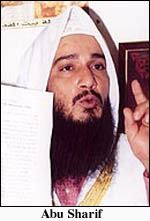 |
Lebanese officials have repeatedly emphasized the need to differentiate between terrorists and those who "resist occupation," a distinction which appears mainly intended to protect members of Hezbollah but in fact serves as a broad rationale for government inaction.
On September 25, Usbat al-Ansar held a news conference in the Ain al-Hilweh refugee camp and denied that it had any links to bin Laden. A representative of the group, known by the alias Abu Sharif, stressed that the Islamic religion "condemns the killing of innocent people" and said that the alleged involvement of Muslims in the September 11 attacks was a "false accusation." Abu Sharif called upon the Islamic world to "confront the crusader campaign which is receiving regional support," an apparent reference to Israel.3 Lebanese officials have since been reluctant to label the group a terrorist organization
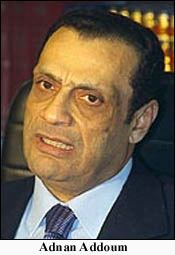 |
Interestingly, Interior Minister Elias Murr earlier acknowledged that Usbat al-Ansar is a "terrorist group," but ruled out any attempt to apprehend Abu Mohjen, who is reportedly holed up in Ain al-Hilweh with around 100-150 armed supporters. "It would be much less costly for us to continue exercising preemptive security measures around the camps, rather than risk the lives of many innocents in a frontal military incursion," said Murr.5 It is common knowledge that the Syrians have vetoed any move by the Lebanese authorities to enter Ain al-Hilweh
More troubling for US investigators is the Lebanese regime's reluctance to lift its notorious bank secrecy restrictions and either freeze the assets of suspected terrorists or provide information about their assets. On September 28, UN Security Council Resolution 1373 called upon all nations to freeze any funds deposited within their borders that are used to finance "terrorist" activities. Central Bank Governor Riad Salameh and other government financial officials have stated that banking secrecy protection will be lifted only in cases where "strong evidence" of illegal activity has been established, a determination which would made by the courts. There are no indications that such steps have been taken with regard to any group or individual since the September 11 attacks.
It is possible that the Lebanese regime may have lifted bank secrecy protection in some cases without publicly acknowledging it. There is a broad consensus in Lebanon that the country's bank secrecy laws are its main competitive advantage in attracting foreign investment. Thus, Lebanese officials do not want to be seen as willing to suspend bank secrecy protection in the face of outside pressure.
Lebanese government sources have insisted that they have provided Washington with intelligence information about Usbat al-Ansar and other suspected groups and individuals linked to bin Laden, but there has been no confirmation of these assertions by US officials and the extent of such cooperation, if any, is not known. What is known is that many such requests have been made by the US. On October 9 the local media reported that the US requested background information about six Lebanese suspected of plotting terrorist attacks in Kuwait. On October 26, Lebanese officials said that the US had requested information about two members of Al-Qa'ida, believed to be residing in Lebanon, who are suspected of involvement in the 1998 bombings of two American embassies in Africa.
There have been a handful of arrests of suspects linked to Usbat al-Ansar. However, these arrests stem less from a willingness on the part of Lebanese officials to cooperate with the US than from the intensified security presence that the regime has deployed around the country since the initiation of US air strikes against Afghanistan. Earlier this month, internal security forces arrested a member of the group, Muhammad Zeidan, who was found standing outside the Justice Palace in Sidon. However, Zeidan was taken into custody only because there were 17 outstanding warrants for his arrest on robbery charges. Security forces also arrested two men in the northern city of Tripoli, Daniel Ahmad Samarji and Bilal Ali Othman, on charges of creating a terrorist group called the Sharia (Islamic law) Army which planned attacks against US targets in the Middle East. Samarji reportedly admitted that a member of bin Laden's terror network, code-named Abu Mujahed, sent money to the group from Copenhagen to help buy weapons and conduct training.
Part of the reason why Lebanese officials are reluctant to cooperate with the US is that even mainstream Sunni Islamist organizations have condemned the American "war on terror" as a crusade against all Muslims. Fathi Yakan, the spiritual leader of Al-Jama'a al-Islamiyya (The Islamic Association), an urban-based Sunni fundamentalist movement operating mainly in Tripoli, Sidon and Akkar, called the September 11 attacks a "heavenly blow" against symbols of American economic and military power and warned that the United States is making war against "Islam and Muslims everywhere" under the guise of fighting terrorism.6
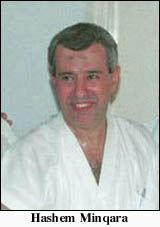 |
The Question of Hezbollah
American officials have avoided mentioning Hezbollah in the context of the US war on terror. Most Lebanese do not regard the Shi'ite Islamist movement as a terrorist organization because Hezbollah guerrillas have restricted their attacks to Israeli military targets in recent years.
Importantly, Mughniyah and others allegedly responsible for Hezbollah attacks on American targets in Lebanon during the 1980s are no longer believed to occupy official positions in the organization. Nevertheless, Hezbollah officials have refused to confirm this. "We're not going to comment on the names because we reject the list altogether," said the group's second-in-command, Sheikh Naim Kassem. "We won't submit a statement of account to anyone about the relationships of the names to Hezbollah."
After the September 11 attacks, reports in Lebanese press alluded to a quid pro quo between the United States and the Syrian and Lebanese governments: American officials will not focus attention on Hezbollah or its senior leadership in the context of the US war on terror or demand that the Lebanese regime freeze the group's assets. In return, Damascus and Beirut will see to it that Hezbollah does not launch any attacks against Israeli forces in the disputed Shebaa Farms area. Ambassador Battle clearly kept his end of the bargain and was even reported by one Lebanese newspaper to have told guests at a recent dinner that Hezbollah has nothing to do with the terrorism that the US is combatting.8
On October 18, the Lebanese daily Al-Safir reported that American officials presented the Lebanese government with a new list of suspected terrorists whose assets must be frozen, which included Hezbollah Secretary-General Hassan Nasrallah and his predecessor, Sobhi Toufaili. This prompted a heated denial from Ambassador Battle. "They are not included on the list," he told reporters after meeting with Information Minister Ghazi Aridi. "I won't say anything more about the lists ever again."9
To the chagrin of American officials, however, Hezbollah has not observed (or, rather, not been forced by the Syrians to observe) a moratorium on attacks against Israeli forces. On October 3, Hezbollah launched a mortar attack on Israeli outposts overlooking the Shebaa Farms, its first operation against Israeli forces in three months. After this, US pressure on the Lebanese government to rein in Hezbollah intensified and it became widely expected that the group would end such provocations.
On October 22, however, Hezbollah launched a second attack, firing dozens of mortar rounds and rockets at the outposts, causing structural damage and eliciting Israeli reprisals. The attack followed sharp US criticism of a major Israeli incursion into Palestinian Authority-controlled areas of the West Bank. Shortly afterwards, Nasrallah declared that more operations would be coming, while Syrian Foreign Minister Farouq al-Shara openly defended the assault.
Battle was outraged by the attack and contacted President Emile Lahoud and Prime Minister Rafiq Hariri late that evening to issue what official sources quoted in Al-Safir described as "a strongly worded message that sounded like a warning."10 Agence France Presse quoted a government source as saying that Battle warned Lahoud that the US "could not continue to restrain Israel if attacks and violations of the blue line continue or prevent it from carrying out (military) action."11 Back in Washington, President Bush called Hezbollah a terrorist group of "global reach" during a meeting with Israeli Foreign Minister Shimon Peres, appearing to suggest that his administration's hands off policy toward Hezbollah will end if the attacks continue.
Notes
1 Agence France Presse, 19 September 2001.
2 L'Orient-Le Jour (Beirut), 12 October 2001.
3 Tele-Liban TV (Beirut), 25 September 2001.
4 The Daily Star (Beirut), 11 October 2001.
5 Al-Nahar (Beirut), 10 October 2001.
6 Al-Nahar (Beirut), 13 October 2001.
7 Al-Safir (Beirut), 8 October 2001.
8 Al-Anwar (Beirut), 25 October 2001.
9 Al-Safir (Beirut), 18 October 2001, The Daily Star (Beirut), 19 October 2001
10 Al-Safir (Beirut), 24 October 2001.
11 Agence France Presse, 24 October 2001.